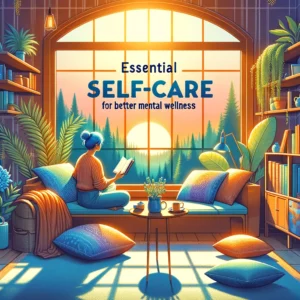Do you want some essential self-care tips for better mental health? Let’s start by diving into how self-care practices directly impact your mental health. You might already know that taking care of your body affects your physical well-being, but it’s crucial to understand that it’s just as important for your mind.
You might already know that taking care of your body affects your physical well-being, but it’s crucial to understand that it’s just as important for your mind.
Neglecting self-care isn’t just about missing a spa day. It can have real, tangible effects on your mental health. Think about it like skipping meals. Sure, you might get through the day, but over time, your body starts to suffer. Similarly, your mind needs regular ‘nourishment’ in the form of self-care.
Recognizing the signs of mental exhaustion is vital. This isn’t just about feeling tired; it’s also about feeling emotionally drained, irritable, or disconnected. These are all signals that your mental health could use some extra attention. If you’re noticing these symptoms, it’s probably time to step up your self-care game.
Now, as we move on, remember that self-care isn’t one-size-fits-all. We’re going to delve into how you can establish a personalized self-care routine that aligns with your unique needs. So, let’s set the stage for creating a self-care plan that supports both your mental and emotional health.
Establishing a Personalized Self-care Routine
I’m going to guide you through the process of tailoring a self-care routine that aligns with who you are. This isn’t just about following trends, it’s also about recognizing your unique needs and what truly rejuvenates you.
You’re going to learn to assess your needs for a self-care plan. Think about what activities make you feel rested, what hobbies ignite your passion, and what practices keep you grounded. Choose something that resonates with you, whether that’s a quiet walk in the park or an energetic dance class.
feel rested, what hobbies ignite your passion, and what practices keep you grounded. Choose something that resonates with you, whether that’s a quiet walk in the park or an energetic dance class.
When crafting a self-care routine, don’t worry too much about sticking to a strict regimen. A well-balanced plan should address various aspects of your well-being, from your physical health with regular exercise and nutritious meals, to your emotional state through meditation or connecting with loved ones.
Consistency is key in self-care, but you can always adjust your approach down the road if certain activities aren’t serving you well. Remember to be kind to yourself; self-care is, after all, about self-compassion as much as it is about the activities you engage in.
Top Self-care Activities for Enhanced Mental Health
I’m here to help you with some top self-care strategies that can make a noticeable difference to your mental health. Mindfulness and meditation, believe it or not, aren’t just buzzwords; they’re practical tools for stress reduction. Taking even a few minutes each day to practice can help you lower anxiety levels and improve overall mood.
Physical exercise is another key player. You don’t need to run marathons or lift heavy weights to get the benefits. Choose something that resonates with you, whether it’s a brisk walk, a dance class, or gentle yoga. Regular movement can be a powerful mood booster and provides a natural remedy for anxiety. 
If you love to reflect and express yourself, journaling or engaging in creative activities like painting or playing music can be incredibly therapeutic. It allows you to process emotions and thoughts that might be too complex to articulate verbally. Remember, your journal is for you—don’t worry too much about spelling or grammar.
A lot is happening very quickly in our lives, and sometimes we forget the importance of human connection. Reaching out to friends, joining clubs or groups, or even just spending quality time with family can nurture your emotional health by providing support and a sense of belonging.
Now, in the next section, we’re going to look at how to keep your self-care practices on track, even when life throws you curveballs, and how to recognize when it might be time to seek professional support for your mental health.
Navigating Challenges in Self-care Practice
Okay, so you’re loaded up with self-care activities that are good for your mental health, but I’m going to be real with you: it’s not always going to be a smooth ride. Life has a funny way of throwing curveballs just when you think you’ve got your routine down.
Time is a precious commodity, and I get it, it often feels like there isn’t enough of it to fit in self-care. That’s when you need to get creative. Think quality over quantity. Ten minutes of deep breathing or a quick walk around the block can do wonders. And remember, self-care isn’t selfish; it’s necessary, so make it a priority.
Lack of motivation is another real struggle. If you find yourself dragging your feet, it might be time to switch things up. Choose something that resonates with you in the moment. And you know what? It’s okay to start small. The key is to just get started—whether it’s with a single yoga pose or writing one line in your journal.
Then there’s the question, ‘When should I seek professional help?’ Listen, self-care is powerful, but it’s not a panacea. If you’re feeling overwhelmed, or if your mental health is interfering with your daily life, reaching out to a psychologist or counselor is a smart move. There’s strength in seeking help, and it can be the complementary support you need alongside your self-care practices.
In wrapping up, remember that the path to mental well-being is uniquely yours. Your first attempt doesn’t need to be your last. Adjust your approach as you go, listen to what your mind and body are telling you, and above all, be kind to yourself along the journey. After all, self-care is about creating a quality of life that helps you thrive, not just survive.
“Meditation is bringing the mind home.” Sogyal Rinpoche
Looking for ways to apply self-care during the busy holiday season? Check out our Holiday Survival series for tailored tips!
JOIN OUR COMMUNITY ON FACEBOOK

